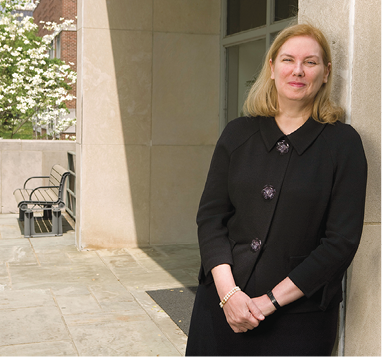
Stephanie Parker ’84 wants to get down to business. As the incoming president of Vanderbilt Law School’s Board of Advisors, she is eager to apply the work ethic that has made her a top litigator at Jones Day to her work on behalf of the law school. “I want the board to stay focused and brainstorm at every meeting about how to help the law school,” said Parker, a partner in Jones Day’s Atlanta office, where she focuses on product liability defense and mass tort cases. “Everyone’s time is limited, so I want the time they invest in the law school to be meaningful.”
The Board of Advisors meets at the law school twice each year, and members are on call to support the school throughout their three-year terms. Board members provide advice and counsel on curriculum enhancements; invest in the school financially; help recruit bright, motivated students; mentor current students; and recruit and hire recent graduates. Parker’s two-year term as president began in the fall, and she is approaching the job with three goals in mind: supporting Dean Chris Guthrie and law faculty in planning for the law school’s future, expanding the alumni support base, and increasing alumni giving. “I particularly want to increase the visibility of women alumni leaders and giving from that group,” she said. Parker has led by example; she established the Ethel and Cecil Roberts Scholarship in 2005.
While encouraging alumni to invest financially in the law school is a top priority, Parker also hopes to encourage alumni to support the school in other ways. “I want the board to think outside the box when it comes to ways we can support the law school and enhance the student experience here,” she said. “Did you argue a case in front of the Supreme Court? Will you come share that experience at the school? If the university is working on a grant proposal, who in our network has a relationship with the organization that can support our efforts? There is so much we can do to support the school in addition to our gifts.”
Parker is also excited about the opportunity to think about legal education in terms of the future of legal practice. “At Jones Day, we’re international, so this is a global issue for us,” Parker said. “The questions we are asking are many of the same ones the law school is debating as they determine how best to prepare students for practice: What are the substantive practice areas of the future? With some legal work flowing to non-lawyers or even software, what tasks will require highly trained lawyers? Can we project what the economy will do? How do we best serve our clients?
“In law school, I had great opportunities, such as Moot Court, but I had to step forward and take the initiative,” Parker said. “Young lawyers need to be smart and focused in terms of seeking out opportunities and assignments at their firms, and we need to make sure Vanderbilt students are well prepared to do that.”